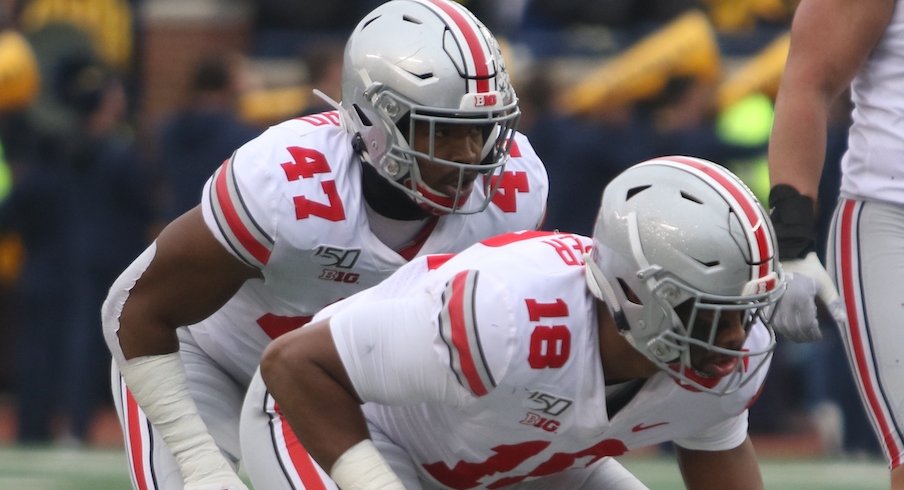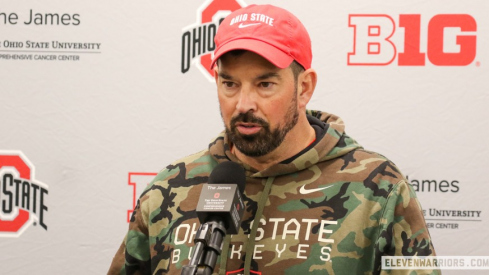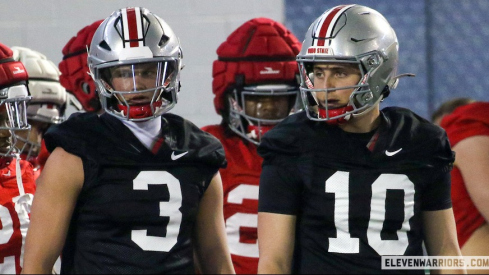A postponed Big Ten football season impacts everybody, and you could feel the negative emotions in the players' real-time reactions to the news.
The heartbreak was wide-reaching and felt by everyone in the program to some extent, but some will feel the impacts more than others.
Here are the players we feel are most impacted by the decision.
Jonathon Cooper
This was supposed to be Jonathon Cooper's true last ride after his senior season didn't go as planned last year.
Cooper was named a captain last season and was expected to be the starter on the defensive line opposite of Chase Young, but injuries kept him sidelined for long enough that he elected to take a redshirt season, playing only four games including a finale against Michigan.
Now a fifth-year senior and a captain once again, Cooper was healthy and ready to lead the team as a veteran presence on a young defensive line, and prove himself as an NFL prospect in the process.
Without a fall season and with so much uncertainty surrounding a potential spring season, Cooper did not know what his plans would be following the Big Ten's decision to postpone.
“I wish I could say. I honestly do. I don’t know what I’m going to do right now, at this point in time,” Cooper said. “This is the second time two years in a row that my season has been somewhat taken away from me without my control, and that’s a lot. It sucks. So just trying to figure out what is the best route for me and my family right now. Just trying to listen and get my emotions in check, because once again, this just happened yesterday, and I’m still coming to terms with the fact that I’m not able to play right now.”
The NCAA is expected to preserve this season of eligibility for all fall athletes regardless of how many competitions they participate in this fall or spring, which would give Cooper yet another season eligibility should he choose to return to Ohio State once again in the fall.
But another year of eligibility does not change the fact that Cooper's senior season has now been taken away or significantly altered for a second-straight year. And there's also a possibility Cooper has played his last game as a Buckeye, as delaying his NFL dreams even longer might just be too much to ask.
Justin Hilliard
Few players have had tougher luck with injuries than Justin Hilliard.
The former five-star linebacker tore each of his biceps over his first two years at Ohio State, and after returning and becoming a key player on special teams in 2017 and 2018, Hilliard ruptured his Achilles in the spring of 2019.
But Hilliard always battled back. Last season he became a regular in the Buckeyes’ four-linebacker package and even started two games, finishing the season with 13 tackles, three tackles for loss and a clutch game-sealing interception against Penn State.
Due to his extensive injury history, Hilliard was granted a rare sixth season of eligibility and was set to be a captain, a leader and a regular contributor for the Buckeyes one final time. Then, the Big Ten postponed its fall season.
Like Cooper, there's a chance Hilliard could still play in the spring and could potentially even return for an unprecedented seventh season with the Buckeyes, but there's also the chance he decides to move on and train for the next level.
Trey Sermon
Trey Sermon's move to Ohio State made sense for all parties when he announced he would join the team as a graduate transfer from Oklahoma this offseason.
The Buckeyes had quite a banged-up running backs room with no returning starter and Sermon was looking for somewhere to star in his final season of eligibility after an injury-shortened junior season at Oklahoma that saw him sharing carries with Kennedy Brooks.
Now, with the Big Ten postponing its fall season, Sermon will not have the senior season he planned. It's unlikely he'll ever be sharing a backfield with Justin Fields, who played high school football less than 15 miles away from his Sprayberry High School in Georgia, and if he decides to enter this year's NFL Draft, he'll never have a full fall season in Columbus, even if he does decide to play in the spring.
To make matters even more frustrating for Sermon, the Big 12 is still moving forward with a fall season and Brooks has decided to opt out of the season to prepare for the NFL Draft. Had he stayed at Oklahoma, he not only would still be preparing for a fall season but he would likely be the team's starting running back.
With the NCAA's plan, Sermon will maintain his eligibility from this season and could return to the Buckeyes next season, but the roster situation would be less advantageous with Master Teague and Marcus Crowley presumably healthy and the addition of highly-touted freshmen TreVeyon Henderson and Evan Pryor. All of the sudden, it would be quite the crowded running backs room.
Shaun Wade
Even though Shaun Wade almost-certainly has a future in the NFL and could potentially still be a first-round pick if he doesn't play another college snap, there's a reason why he returned to Ohio State.
Wade did not receive the feedback he'd hoped and decided not to enter the 2020 Draft, electing instead to return to Ohio State and play an outside cornerback position, which he says is his most natural position and the position he would like to play in the NFL, despite playing in the slot and as a safety his entire Buckeye career thus far.
A season playing outside would have enormously improved his draft stock, but Wade will no longer get that chance. Wade's father has made it clear that his son will not play a spring college football season, which means that his Buckeye career is over.
Though Wade will undeniably still be drafted and could still even be a first-round pick, he'll be asking teams to select him to play a position he technically hasn't played since high school with game film that's 18 months old while other players play either a fall or spring season. No matter what, his stock won't be what it could have been if he had one last season.


